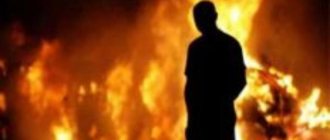If a person has committed unintentional damage to someone else's property, he can be prosecuted only in a few cases. It is this circumstance that distinguishes such a situation from similar actions, but committed with intent, for which more severe penalties are imposed.
Damage to property through negligence is a fairly common phenomenon, for which Article 168 of the Criminal Code provides for criminal liability.
Download for viewing and printing:
Article 168 of the Criminal Code of the Russian Federation “Destruction or damage to property through negligence”
Unintentional damage to property
Unintentional damage to someone else's property means causing harm to someone else's property that has material value and expression, without direct intent for such an outcome.
When is liability provided?
Punishments against the offender are applied when the unlawful act committed meets two conditions:
- The amount of damage caused as a result of careless actions by the guilty person exceeds the mark established in the Criminal Code for large damage of 250,000 rubles;
- Damage to property was caused by careless handling of fire or other sources of increased danger.
Criminal liability
Criminal actions that caused unintentional damage to property entail holding the guilty person accountable under the Criminal Code.
However, the application of punishment against the offender is possible only in cases where the damage caused by his actions is considered major. The offender faces one of the following penalties:
- Fine of up to 120,000 rubles;
- Performing mandatory work for up to 480 hours;
- Carrying out correctional work, the maximum duration of which should not exceed 2 years;
- Restriction of freedom. The maximum sentence is 1 year;
- Carrying out forced labor for up to 1 year;
- Imprisonment for up to 1 year.
When property damage does not fall under the Criminal Code
Bringing the guilty person to justice is possible only in cases where major damage has occurred as a result of unintentional damage or complete destruction of property. Accordingly, if the value of the lost property is below this level, bringing the guilty person to criminal liability is not allowed.
Concept of destruction and damage to property
The concept of “Property damage” requires more detailed study. This term is evaluative, so specifying the damage itself is just as important as applying sanctions to persons who may be suspected of committing this crime.
The question arises as to whether the actions committed by a specific person fit this article. An intentional act, which is similar in description to Article 167 of the Criminal Code of the Russian Federation, but differs in meaning, can serve to incorrectly sentence the defendant himself.
Destruction of property is the complete loss by its owner of the useful characteristics of a certain item. Accordingly, based on this definition, damage is understood as a partial loss of the very benefits that their owner would have received if the things had not been damaged. As for quantitative measurements, the reduction of certain benefits represents a possible consequence of this crime.
The corpus delicti under Article 168
This article of the code contains a list of penalties that apply to a criminal who has destroyed or damaged someone else’s property through negligence.
To qualify such an offense as an act punishable under this article, it is necessary that the crime has the proper ingredients.
The object of a criminal act is a relationship that falls into the category of property. The subject of the crime is property owned by another person, regardless of its type: movable or immovable.
The objective side of such a criminal act implies damage or complete destruction of movable or immovable property. Qualification of actions as such an offense is possible when the damage was caused by careless handling of a source of increased danger.
The subject of a crime can be any sane person who has reached the age of 16 at the time of the commission of the offense. Particular attention is paid to illegal actions committed by an official. Depending on the circumstances of the case, the crime may be classified under Article 286 of the code, which provides for more severe penalties.
Important! An unlawful act can only be committed through negligence: in the form of criminal frivolity or negligence. Download for viewing and printing:
Article 286 of the Criminal Code of the Russian Federation “Excess of official powers”
Commentary to Art. 167 of the Criminal Code of the Russian Federation
The object of the crime is property relations.
An object is someone else's property (in the sense of a thing), both movable and immovable. It should be noted that the Plenum of the Supreme Court of the Russian Federation in relation to this crime gave a fundamentally different concept of someone else’s property than in relation to theft. Other people's property includes, in particular, property that is in common ownership of the perpetrator and other persons (only damage caused to other persons is taken into account) (clause 8 of the Resolution of the Plenum of the Supreme Court of the Russian Federation dated June 5, 2002 No. 14 “On judicial practice in cases of violation of fire safety rules, destruction or damage to property by arson or as a result of careless handling of fire").
If a person destroys or damages his own property in a generally dangerous way, and as a result, with direct or indirect intent, damage is caused to the property of others, the act also entails liability under Art. 167 of the Criminal Code of the Russian Federation. If, under the same circumstances, damage to someone else’s property is caused by negligence, the act is qualified under Art. 168 of the Criminal Code of the Russian Federation (in both cases, when calculating damage, only the damage caused to someone else’s property is taken into account).
The objective side includes action, consequences and causation.
The act can be expressed in any action or inaction that entailed the consequences specified in the law. The law does not specify the content of the act in this crime.
Consequences - significant property damage, expressed in destruction or damage to property. Destruction of property means rendering it completely unusable. Destroyed property cannot be restored. It cannot be used for its intended purpose. Damage is understood as causing harm to a thing, significantly reducing its consumer value. Damage to property presupposes the possibility of using it in a damaged state and (or) the possibility of restoring it to its previous condition.
Significant damage is an assessment indicator. Moreover, if damage is caused to a citizen, by virtue of Note 2 to Art. 158 of the Criminal Code of the Russian Federation cannot be less than two and a half thousand rubles. Obviously, significant damage to the organization should amount to no less. Paragraph 6 of the Resolution of the Plenum of the Supreme Court of the Russian Federation dated June 5, 2002 N 14 “On judicial practice in cases of violation of fire safety rules, destruction or damage to property by arson or as a result of careless handling of fire” states that “when resolving the issue whether significant damage has been caused to the owner or other holder of property should be based on the value of the destroyed property or the cost of restoring damaged property, the significance of this property for the victim, for example, depending on the type of his activity and financial situation or the financial and economic condition of the legal entity that was owner or other possessor of destroyed or damaged property.”
When qualifying a crime, actual damage without lost profits is taken into account. When property is destroyed, the damage is determined by its value. If property is damaged, the damage is determined by the cost of repairs, taking into account a possible price reduction. When property is damaged, if its restoration is impossible or impractical, the damage is determined as the difference in price before and after the damage. When assessing damage as a result of destruction or damage to used property, its depreciation is taken into account.
Losses are subject to compensation in full, including those not taken into account when qualifying the crime.
The corpus delicti is material. The crime is completed from the moment the damage is caused.
Intentional destruction or damage to someone else's property, committed out of hooligan motives, by arson, explosion or other generally dangerous method, entails criminal liability under Part 2 of Art. 167 of the Criminal Code of the Russian Federation only in the case of actual infliction of significant damage to the victim. If, as a result of these actions, the consequences provided for by law did not occur for reasons independent of the will of the perpetrator, then what he did if he had the intent to cause significant damage should be considered as an attempt to deliberately destroy or damage someone else’s property (Part 3 of Article 30 and Part 2 Article 167 of the Criminal Code of the Russian Federation).
The actions of the perpetrator related to the destruction or damage of property that was stolen by him represent a way of disposing of stolen property at his own discretion and additional qualification under Art. 167 of the Criminal Code of the Russian Federation is not required. No additional qualifications are required under Art. 167 of the Criminal Code of the Russian Federation and in those situations where damage to property is a method of committing theft, for example, when the culprit damages a car by opening it for the purpose of committing theft.
At the same time, if, during the theft of someone else’s property, the property of the victim, which was not the subject of the theft (for example, furniture, household appliances and other things), was intentionally destroyed or damaged, the act should be additionally qualified under Art. 167 of the Criminal Code of the Russian Federation, subject to causing significant damage.
The subjective side is characterized by guilt in the form of intent (direct or indirect), when the perpetrator is aware of the social danger of his act, foresees the possibility or inevitability of socially dangerous consequences in the form of damage and wants them to occur or does not want them, but consciously allows these consequences or is indifferent to them . Attempted crime is only possible with direct intent.
As stated above, for the existence of the crime under consideration, the perpetrator must be aware of the fact that he is destroying someone else’s property. Therefore, there is no corpus delicti in cases where such awareness is absent, for example, if the culprit purchased a stolen car, which he was not aware of, and dismantled it, then his actions do not contain corpus delicti, since as a bona fide purchaser of the car the person disposes of the car as his own property and dismantles it, without the intent to destroy someone else’s property.
The general subject of the crime is a sane person who has reached the age of sixteen. According to Part 2 of Art. 167 of the Criminal Code of the Russian Federation, responsibility begins at the age of fourteen.
Qualifying features:
1) hooligan motives;
2) arson, explosion or other generally dangerous method;
3) causing the death of a person or other grave consequences through negligence.
Part 2 Art. 167 of the Criminal Code of the Russian Federation can be imputed only if all the signs of a crime provided for in Part 1 of this article are present, including significant damage. Therefore, the destruction of low-value property in a generally dangerous manner or for hooligan reasons, which does not cause significant damage, does not entail criminal liability under this article at all. If grave consequences are caused by negligence under such circumstances, the act must be qualified under Art. 168 of the Criminal Code of the Russian Federation or according to the norms on crimes against the person (depending on the severity of the harm caused).
If there is direct intent aimed at causing property damage in a significant amount, it is possible to qualify the act as an attempted crime under Part 2 of Art. 167 of the Criminal Code of the Russian Federation, if the damage in a significant amount was not caused due to circumstances beyond the control of the person.
Hooligan motives include, for example, the desire to oppose oneself to society, the commission of an act without motive or its commission for a minor reason.
The use of fire in itself is not enough to qualify the offense under Part 2 of Art. 167 of the Criminal Code of the Russian Federation, there must be a real threat of harm to the life or health of a person or the property of other persons. Deliberate destruction or damage to individual objects using fire under conditions that exclude its spread to other objects and the emergence of a threat of harm to the life and health of people, as well as other people’s property, must be qualified under Part 1 of Art. 167 of the Criminal Code of the Russian Federation, if the victim suffered significant damage.
Although the law indicates a “generally dangerous method”, this qualifying feature is imputed not only with direct, but also with indirect intent (clause 9 of the Resolution of the Plenum of the Supreme Court of the Russian Federation of June 5, 2002 No. 14 “On judicial practice in cases of violation of fire safety rules safety, destruction or damage to property by arson or as a result of careless handling of fire"). Thus, if, when destroying or damaging someone else’s property by arson or in another generally dangerous way, the perpetrator foresaw and wanted or did not want, but consciously allowed the occurrence of such consequences of his act as the death of a person or harm to the health of the victim, the act constitutes a set of crimes provided for in Part. 2 tbsp. 167 of the Criminal Code of the Russian Federation and depending on the intent and the consequences that occurred - clause “e”, part 2 of Art. 105 or paragraph “c” of Part 2 of Art. 111 or Art. Art. 112, 115 of the Criminal Code of the Russian Federation.
A generally dangerous method is understood as a method that creates a threat of destruction of property of an unlimited number of people or a threat to their life and health (explosion, arson, flooding, etc.).
The attitude towards the consequences in the form of a person’s death can only be careless. In this case, the subjective side of the crime is expressed in the presence of two forms of guilt. With intent, liability for murder arises, which does not exclude imputation based on the totality of crimes in Part 2 of Art. 167 of the Criminal Code of the Russian Federation.
Other “grave consequences caused by negligence as a result of the intentional destruction or damage of property (part two of Article 167 of the Criminal Code of the Russian Federation) include, in particular: the negligent infliction of grievous harm to the health of at least one person or the infliction of moderate harm to the health of two or more persons ; leaving victims without housing or means of subsistence; long-term suspension or disruption of the work of an enterprise, institution or organization; long-term disconnection of consumers from life support sources - electricity, gas, heat, water supply, etc.” (Clause 10 of the Resolution of the Plenum of the Supreme Court of the Russian Federation of June 5, 2002 N 14 “On judicial practice in cases of violation of fire safety rules, destruction or damage to property by arson or as a result of careless handling of fire”).
Intentional infliction of death and any harm to health (severe, moderate, light) is not covered by Art. 167 of the Criminal Code of the Russian Federation and requires additional qualifications according to the rules on crimes against the person.
Determining the value of an item
To determine whether the perpetrator of the offense is subject to prosecution under the Criminal Code, you need to find out the exact amount of damage caused. As a rule, to establish this circumstance, the owner turns to an independent expert to conduct research at the preliminary investigation stage.
Most often, the expert conducts research on the following real estate objects:
- Motor transport;
- Real estate;
- Goods that are considered expensive. The cost of these property items is determined on the basis of sales receipts (if these documents are available).
If, based on the results of the examination, it is established that the amount of damage caused by negligence is large, the victim may apply to initiate a criminal case.






